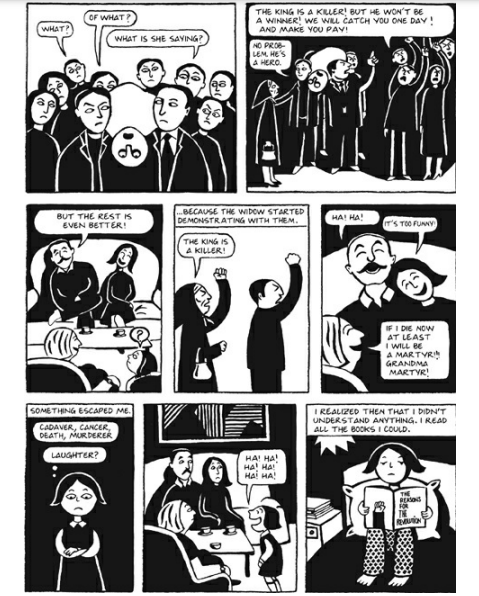A distinctive feature of modern society – its differences in national, social, demographic, class, gender, religious, material, and other characteristics – has given rise to social inequality and oppression. Marjane Satrapi’s novel Persepolis provides an autobiographical account of experiencing systemic political oppression, telling a story of futile resistance and realization of perpetuity of oppression. It is popular to believe in the superiority of peaceful and lawful political resistance to other approaches; however, Satrapi’s story proves that diplomacy does not always secure successful peacemaking. In fact, her story reveals that oppression cannot always be eradicated neither by violence nor peaceful protesting, and the best course for action for the persecuted is fleeing while possible. Nevertheless, one thing that is invaluable regardless the successfulness of resistance is education. Throughout the novel, Satrapi illustrates the importance of education in resisting political oppression through the experiences of herself and the people around her.
One of the key themes of Marjane Satrapi’s novel Persepolis is the importance of education in resisting oppression. Satrapi’s own story is a testament to the transformative power of education. Despite living under a repressive regime in Iran, Satrapi was able to pursue her education and gain a deep understanding of her country’s history, politics, and culture. This knowledge allowed her to better understand the roots of the oppression she experienced and to develop strategies for resisting it.
Throughout the novel, she engages in critical thinking and intellectual pursuits, reading books, attending university, and engaging in debates and discussions with her peers. She recalls a scene from her childhood when she tried to engage in a politics conversation with her parents but fell short of understanding. As she writes in her visual novel, “I realized then that I didn’t understand anything; I read all the books I could” (Satrapi 36).

This education not only helps her to better understand the complex issues facing her society, but also gives her the knowledge and skills to resist oppression in a more effective and informed way.
Additionally, Satrapi’s education allows her to connect with others who share her values and beliefs. Through her studies, she meets like-minded individuals who are also committed to opposing the oppressive regime in Iran. Together, they form a community of resistance and support, using their education as a tool to inspire and empower each other to fight for change.
In addition to providing individuals with the tools to understand and challenge oppression, education also has the power to build solidarity and foster social change. Through education, people can learn about the struggles and experiences of others and come together to work towards common goals. This sense of community and shared purpose can be a powerful force for change, as it allows people to work together to challenge systems of oppression and create a more just society.
Finally, education also helps Satrapi to develop the resilience and resilience she needs to endure the challenges and hardships she faces. Through her studies, she learns how to cope with difficult circumstances and find meaning and purpose in her struggles. This resilience ultimately helps her to not only survive, but also to thrive despite the oppressive conditions in which she lives.
Education is the most effective tool people have to resist oppression. This may seem counterintuitive, as education is often seen as a passive pursuit that lacks the immediacy of more direct forms of resistance such as protests or acts of civil disobedience. However, education has the unique ability to empower individuals with the knowledge and skills they need to understand and challenge systems of oppression, as well as to advocate for their own rights and the rights of others. While education is not a panacea for oppression, it is a crucial tool that can help individuals to better understand and resist systems of oppression. Whether through formal schooling or self-education, gaining knowledge and understanding is an essential step towards creating a more equitable and just world.
Work Cited
Satrapi, Marjane. Persepolis. Pantheon Books, 2004.